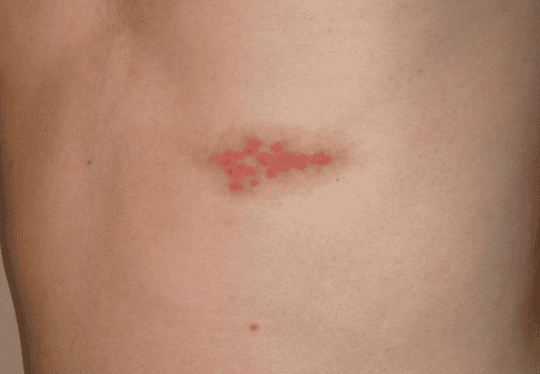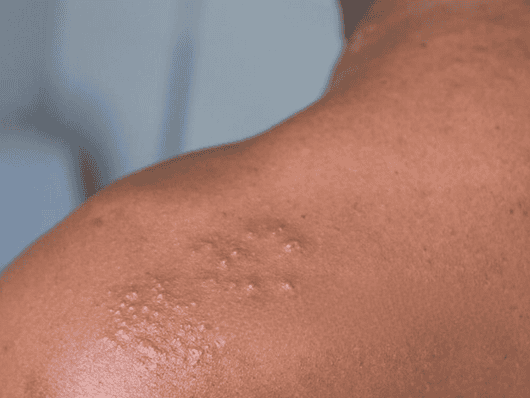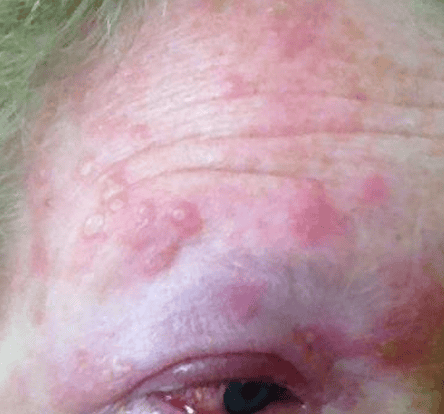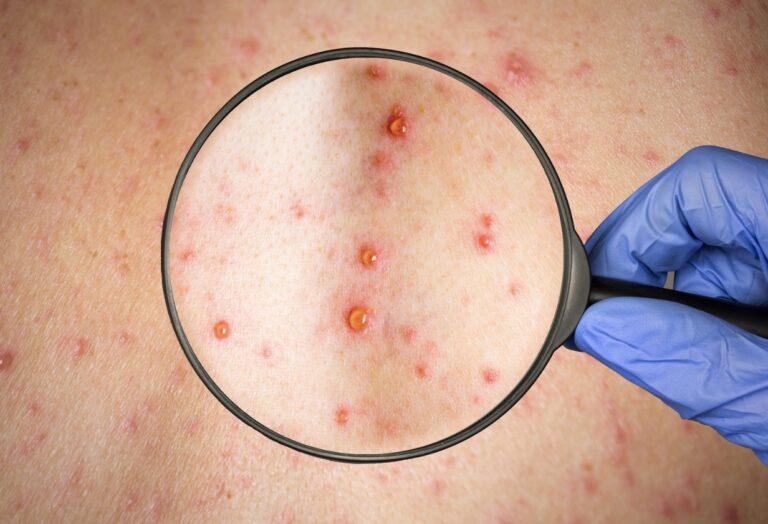Get Treated for Shingles

1
Questions
2
Results
FREE NHS TREATMENTS
Learn More About the Medications That Can Treat Shingles
MEDICAL INFORMATION
Shingles Key Facts
Shingles is a viral infection that affects a nerve or skin around it and is caused by the virus Varicella-Zoster. Varicella-Zoster is incidentally the same virus that causes Chickenpox. You will more than likely have had chickenpox during your childhood. Even though you would have recovered, the virus that caused Chickenpox remains inert and inactive in the body. When it becomes reactivated in adulthood, it causes Shingles.
Shingles typically lasts between two to six weeks and symptoms usually subside between two and four weeks. Most people get shingles only once, but it’s possible to get it two or more times. It’s important to note that not everyone who has had Chickenpox will develop Shingles.
What are the causes of Shingles?
Any factor that compromises your immune system, can trigger shingles:
- Stress
- Other illnesses or conditions
- Treatments like chemotherapy
It’s possible to have shingles more than once, but it’s very rare to get it more than twice.
What are the symptoms of Shingles?
The first signs that may indicate you have Shingles are:
- A general feeling of malaise
- Intense pain and tingling sensation in a particular area of your skin
- Fever (high temperature)
- Headache
- Chills
- Sensitivity to light
What is a Shingles rash?
A few days (2-3 days) after you experience the first symptoms, you may notice a blotchy red rash developing that wraps from the middle of the back to your breastbone. However, it can also appear anywhere on your body including your eyelids, face or genitals. The rash follows the path of the nerve where the virus has been dormant. The rash usually presents on one side of the torso only. If you notice it is on both sides, then it is unlikely to be Shingles.
This blotchy rash then develops into itchy fluid-filled blisters that eventually flatten, become yellowish in colour, dry out and scab. The skin can remain painful until the rash has gone and scabs may leave some slight scarring.



What is Shingles pain?
Pain is usually one of the first signs that may indicate you have shingles. The pain is usually localised in the affected area. The pain experienced can vary from individual to individual but it is generally constant, dull or burning; and the intensity of the pain can vary from being severe to mild. Also, it is notable that some people can experience pain without a rash ever developing.
When to get advice from a GP
You should contact your GP if you suspect you have Shingles and you:
- Haven’t had chickenpox before
- Have been exposed to someone who has chickenpox or shingles and you:
- Are pregnant
- Have a weakened immune system (the body’s natural defence system)
- Are under 18 years old
If your GP is closed, phone 111.
Check if you qualify for FREE treatment with NHS Pharmacy First, without seeing your GP
You may qualify for treatment under the NHS Pharmacy First service, if you suspect you have shingles and you:
- Are 18 years or over
The NHS Pharmacy First service may not be suitable if:
Serious complications are suspected such as:
- Meningitis (neck stiffness, photophobia, mottled skin)
- Mastoiditis (pain, soreness, swelling, tenderness behind the affected ear(s))
- Brain abscess (severe headache, confusion or irritability, muscle weakness)
- Sinus thrombosis (headache behind or around the eyes)
- Facial nerve paralysis
Shingles affects the eyes
- Hutchinson’s sign — a rash on the tip, side, or root of the nose
- Visual symptoms
- Unexplained red eye
You are immunocompromised
- Shingles in severely immunosuppressed patient
- Shingles in immunosuppressed patients where the rash is severe, widespread or the patient is systemically unwell
There’s no cure for shingles, however, when identified early, shingles can be treated with prescription medications to shorten the infection and reduce the risk of complications. The NHS Pharmacy First service is available to all NowPatient users who are registered with the NHS in England. If you are exempt from paying for your prescriptions, the service and the treatments are provided free of charge. If you are not exempt from paying prescription charges, treatments are provided at the prevailing NHS prescription charge rate. There is no charge for consultations.
What NHS Pharmacy First treatments are available for Shingles?
Anti-viral treatments like aciclovir are very effective in reducing the intensity of pain and duration of Shingles. It can also help with reducing the chances of developing post-herpetic neuralgia (burning pain in nerves and skin). Treatment with aciclovir is most effective if started quickly.
How can I manage the symptoms of Shingles?
In addition to treating Shingles with antivirals like aciclovir, you can also treat the discomfort caused by shingles. Painkillers to ease discomfort caused by shingles. This includes:
- Paracetamol (over-the-counter)
- Ibuprofen (over the counter)
- Opioids (prescribed for severe pain)
- Antidepressants (prescribed for severe pain)
Other tips to manage the discomfort include:
- Use a cool damp cloth to soothe the skin and keep blisters clean
- Try calamine lotion to help relieve itching
- Keep the rash as clean and dry as possible
- Do not let dressings or plasters stick to the rash
- Do not use antibiotic cream – this slows healing
- Wear loose-fitting clothing
Should I avoid people if I have Shingles?
Always wash your hands after touching the blisters, as these are very infectious. In addition, during the infection, you should avoid:
- Pregnant women who have not had chickenpox
- Newborns or babies less than 1 month old (unless it’s your own baby)
- Immune-compromised people (weak immune system)
- People taking therapies including disease-modifying anti-rheumatic drugs (DMARDs, e.g. methotrexate) and biologic therapies (e.g. Adalimumab) or any other medication that reduces the immune system such as JAK-inhibitors, e.g. Baricitinib, Filgotinib, Tofacitinib and Upadacitinib
How can I prevent the spread of Shingles?
You can’t spread shingles to other people. However, people can catch chickenpox from you if they haven’t had it before. You are contagious until the last blister has dried and scabbed over. During the contagious phase, you should:
- Not go swimming
- Not play contact sports
- Not go work or school if your rash is weeping (oozing fluid) and can’t be covered
- Not share towels or flannels
- Avoid people who are at risk such as newborns, immunocompromised individuals, people taking immunocompromising drugs and pregnant women
What happens if I do not get treatment for Shingles?
Symptoms will persist for longer, there is a greater risk of post-herpetic neuralgia afterwards. The risk of complications is larger, such as blindness if the infection affects the face/eyes.
Is there a vaccine that can prevent Shingles?
Yes, the NHS recommends that adults turning 65, those aged 70 to 79 and those over 50 who are immunocompromised should be vaccinated.
The vaccine is called SHINGRIX and it is administered in two doses, two months apart. After vaccination, you may still develop Shingles, however, it will be milder and you will be less likely to get post-herpetic neuralgia.
What are the complications of Shingles?
Complications, although not common, can arise as a result of shingles. In fact, 1 in every 1000 cases of Shingles in adults over the age of 70, results in fatal complications. These complications are more likely if you have a compromised immune system, are taking immunocompromising drugs or are elderly.
Complications can include:
- Postherpetic neuralgia
- Eye problems
- Ramsay Hunt syndrome
- The rash becoming infected with bacteria
- White patches (a loss of pigment) or scarring in the area of the rash
Rare complications can include:
- Pneumonia (lungs)
- Encephalitis (brain)
- Transverse myelitis (spinal cord)
- Meningitis (brain, spinal cord)
Sources
- Mayo Clinic – Shingles, not just a band of blisters
- NHS Scotland – Shingles information page
- NHS – Shingles condition
Medical Disclaimer
NowPatient has taken all reasonable steps to ensure that all material is factually accurate, complete, and current. However, the knowledge and experience of a qualified healthcare professional should always be sought after instead of using the information on this page. Before taking any drug, you should always speak to your doctor or another qualified healthcare provider.
The information provided here about medications is subject to change and is not meant to include all uses, precautions, warnings, directions, drug interactions, allergic reactions, or negative effects. The absence of warnings or other information for a particular medication does not imply that the medication or medication combination is appropriate for all patients or for all possible purposes.
Related Articles
Service Guide
Everything You Need to Know About NHS Pharmacy First Eligibility for Shingles
What is NHS Pharmacy First Service for Shingles and how does it work?
If you are aged 18 years and over, and registered with the NHS in England, you may qualify for a FREE remote video consultation and treatment for Shingles, without having to see your GP.
NHS Pharmacy First is available to ALL NHS patients in England and will allow you to get treated for Shingles with prescription-only medications, without having to visit your GP or obtain a prescription.
If treatments are prescribed, they are dispensed and delivered to your home or workplace from NowPatient’s online pharmacy.
The FREE service is subject to an eligibility screen.
Do you treat Shingles through NHS Pharmacy First?
Yes. We also treat the following other conditions:
- Sinusitis
- Sore throats
- Infected insect bites
- Impetigo
- Shingles
- Uncomplicated urinary tract infections in women
Is the NHS Pharmacy First Service for Shingles safe for me to use?
Yes. The NHS Pharmacy First Service is classified as a Class I medical device under UK MDR 2002 regulations, for its intended use. It also complies with NHS standards DTAC, DCB 0160 & DCB 0129.
How much does the service cost?
This is a FREE service for NHS-registered users in England. If you are prescribed medication for Shingles at the end of your assessment and you are not exempt from NHS prescription charges, then you will need to pay a single NHS prescription charge. If you are exempt from prescription charges, for example, if you are on Income Support or aged over 60, then you will not be charged.
Will you have access to my GP records?
Yes, as an NHS patient, our clinicians will be able to access your GP record including medications, observations, and investigations. This ensures our clinicians are able to assess you appropriately.
Is the service secure when conducted remotely?
Yes. NowPatient operates from a HIPAA, DTAC, and Cyber Essentials Plus certified compliant platform that assures the highest levels of information security and allows us to safely handle PHI (Patient Health Information). Clinicians who access our systems do so on a zero-trust basis backed with SSO technologies.
How can I be sure the service is provided by a qualified and trustworthy clinician?
Our clinicians are board-certified pharmacists who are qualified to prescribe selected medications for Shingles, as outlined by the NHS.
Each clinician is registered with the appropriate regulatory body—for example, pharmacists are registered with the General Pharmaceutical Council (GPhC). All clinicians undergo thorough background checks, including a Disclosure and Barring Service (DBS) check, as well as a comprehensive license verification process. When you book an appointment, you’ll be able to view the clinician’s full name, license number, and any specialist credentials.
The medications and conditions our clinicians can prescribe and treat is strictly governed, risk-assessed, and regularly reviewed in line with NHS guidelines. Our service is delivered via remote video consultations (synchronous consultations), which help ensure clinical safety and appropriate prescribing. Please note that medication is not guaranteed and is provided only at the discretion of the assessing clinician.
Do I need to provide any consents before the NHS Pharmacy First Consultation for Shingles?
During the virtual consultation for Shingles, we will obtain a consent from you for providing this service. This is required so we can communicate with your GP and provide information to NHS England, NHS Improvement, and the NHS Business Services Authority (NHSBSA) if required.
Is the service available in the United States and the United Kingdom?
No. At the moment, it is only available in England.
Can I use NowPatient’s NHS Pharmacy First Service for Shingles if I live in Scotland, Wales or Northern Ireland?
This service is commissioned by NHS England and is only available to patients in England. You will not be able to use the feature if you live in Scotland, Wales, or Northern Ireland.
How do I use the NHS Pharmacy First Service for treating Shingles?
Navigate to the NHS Pharmacy First Service Card which can be found in the ‘NHS Hub’ section of the account homepage.
Choose ‘Select Condition’ from the Options Menu on the NHS Pharmacy First Service Card and follow the steps below:
Step 1 – Choose Shingles you would like to treat and click ‘Check Eligibility’
Step 2 – Using the AI Chat Bot, answer the questions presented to determine your eligibility for the service. If you qualify, you’ll be prompted to book a consultation. Click on the ‘Book Consultation’ button to proceed. If you do not qualify, we will signpost you to the right NHS care provider or service.
Step 3 – Now follow the instructions below to complete your booking
What happens during the NHS Pharmacy First Service remote video consultation?
During the consultation, the clinician will ask you a series of questions that will allow the clinician to assess your Shingles and potential treatment options. At the end of the consultation, the clinician will decide if a treatment is a safe and suitable option for you.
If it is, the clinician will discuss the various treatment options that may be available, so that you can jointly agree on the option that is most suited to you. Once you have jointly agreed on a treatment plan, the clinician will issue a prescription order.
Also, with your consent, the clinician may wish to inform your doctor of the treatment that was prescribed. We recommend that you agree to this since your doctor is responsible for your overall care and they should have a record of this consultation and medication prescribed. In addition, our clinician may take the opportunity to advise you on your overall health including advice on healthy living or stop smoking.
What happens after my NHS Pharmacy First Service remote video consultation for Shingles?
You may be sent a short survey asking you about your experience attending your remote video consultation. We encourage you to complete this as it provides us with valuable feedback to improve your experience in the future. It’s helpful for us if you point out things that didn’t go well, and suggest ways of improving the experience for you and others.
At the end of the consultation, you will receive a notification which will summarise the outcome. It will also advise you if any referrals were made to your doctor, along with any other advice that was given to you by the clinician. You will be notified of the summary via an In-App and Push notification. Once you receive the notification, navigate to ‘Notifications’ on the account homepage and you will be able to view it.
What happens if I’ve been prescribed a treatment for Shingles?
If your attending clinician prescribes a treatment for Shingles during the virtual consultation, you will be informed at that time. To complete your checkout, please follow the steps outlined below.
What status updates do I get after I place my order?
NowPatient uses a structured notification system for all orders, ensuring you’re consistently informed about your order status every step of the way.
You can expect status update notifications through the following channels:
- In-App
How will my order be delivered?
All orders are shipped in discreet and unmarked packaging. This means it is suitable for delivery wherever you require (home, work, or a neighbour).
For thermo-sensitive orders we use cold chain-validated packaging. Your parcel will normally receive an estimated delivery window from the courier on the day of delivery.
For your protection and safety, your first order can only be delivered to the address that is registered with NowPatient. Future orders can be delivered to any other address, for example, your workplace.
Do you ship cold-chain or temperature sensitive products?
Yes. We use a specialist courier service for all thermo-sensitive deliveries. This is to ensure that cold chain integrity is always maintained and thus the product quality, safety and efficacy.
Learn more about how we handle the delivery of temperature sensitive products.
Where do you deliver?
We currently deliver to all postcodes in England. Some postcodes in rural areas may have a slightly longer delivery time.
When will my order arrive?
We aim to ship all orders placed Monday – Friday before 3pm on the same day. Orders placed outside these times will be shipped the next working day. All deliveries are shipped by Royal Mail, which delivers Monday through Saturday in the UK.
Our delivery options have the following delivery times (England Only):
- Royal Mail Standard Tracked & Signed for Delivery for NHS prescriptions – 2/3 day delivery (normally 48 hours)
- DHL Express Tracked Delivery – 1/2 day delivery (normally 24 hours)
- Royal Mail Special Delivery – Next working day (Royal Mail Guaranteed before 1pm)
What should I do if my order has not arrived?
Delivery is normally made promptly after your dispatch notification is received. You can check the tracking details of your order in the ‘Notification Feed’ section of the dashboard, at any point after dispatch.
Unfortunately, packages can sometimes get lost in the delivery system. If after 10 days you have not received your delivery, please contact us and we will do all we can to resolve the problem.
























